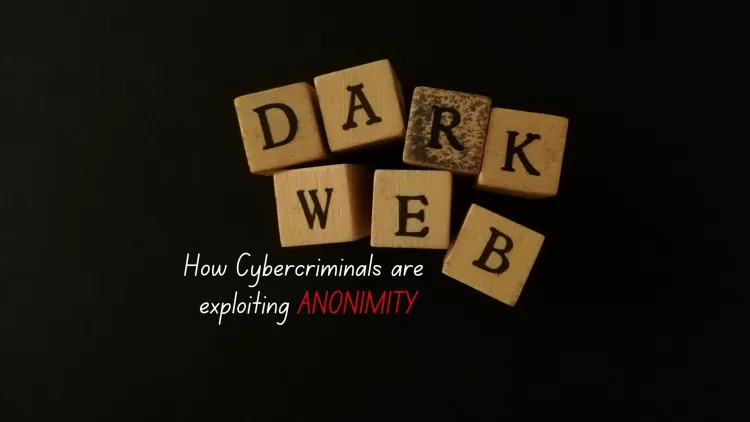India's Dark Web Problem | How Cybercriminals Are Exploiting Anonymity
The dark web, a hidden part of the internet accessed through special tools like Tor, is increasingly linked to cybercrime in India, with at least 20% of reported cases involving its use. A study by Lisianthus highlights how the anonymity provided by the dark web facilitates illegal activities such as data theft, malware distribution, and hiring hackers. Tackling these issues requires stronger monitoring systems, public awareness, stricter laws, and better training for law enforcement. Partnerships between governments, cybersecurity companies, and global organizations are essential to counter dark web-related crimes and create a safer digital environment.

Cybercrime is becoming a bigger problem in India, and the dark web is playing an important role in many of these cases. A recent study by Lisianthus, a cybersecurity company, found that at least 20% of cybercrimes in India involve attackers using the dark web. This hidden part of the internet makes it hard to track criminals and stop illegal activities.
What is the Dark Web?
The dark web is a secret part of the internet that can’t be accessed using regular search engines like Google or Bing. Special tools like Tor (The Onion Router) or I2P (Invisible Internet Project) are needed to access it. These tools make users anonymous, meaning their identity and location are almost impossible to trace. This makes the dark web a popular place for illegal activities, including cybercrimes.
The Study by Lisianthus
Khushhal Kaushik, CEO of Lisianthus Tech, explained that the study was conducted over two months. The research team analyzed cybercrime cases reported across India. Data was collected from:
-
State police departments
-
The National Crime Records Bureau (NCRB)
-
Other cybercrime reporting portals
The team also worked with cybersecurity experts, law enforcement officers, and consultants to understand the patterns and risks involved.
Key Findings
Here are some important points from the study:
1. Dark Web Usage
One in five cybercrimes in India involves attackers using the dark web.
2. Anonymity Advantage
The dark web provides a shield for criminals, making it hard to track them.
3. Illegal Activities
Criminals use the dark web to sell stolen data, spread malware, and even hire hackers.
Why This is a Problem
The anonymity of the dark web makes it a powerful tool for criminals. It allows them to carry out activities like stealing personal information, hacking into accounts, and selling illegal goods. This makes it harder for authorities to stop them and protect the public.
What Can Be Done?
To tackle the problems caused by the dark web, we need strong measures. Here are some steps:
1. Better Monitoring
Governments and police need advanced tools to track illegal activities on the dark web. Working with global organizations can also help.
2. Public Awareness
People should be aware of how to protect themselves online. Using strong passwords, enabling two-factor authentication, and being cautious about sharing personal information can reduce risks.
3. Stronger Laws
There should be stricter laws and penalties for cybercrimes involving the dark web. This can discourage criminals from using these platforms.
4. Training Law Enforcement
Police and other officials need proper training to deal with cybercrimes linked to the dark web. With the right knowledge and tools, they can catch offenders more effectively.
5. Partnerships with Tech Companies
Cybersecurity companies like Lisianthus can provide valuable support to law enforcement. Working together can help improve cybersecurity systems.
Conclusion
The dark web is a growing challenge in the fight against cybercrime in India. The study by Lisianthus highlights the need for urgent action to address this issue. By improving technology, spreading awareness, and strengthening laws, we can work towards a safer digital environment for everyone. Protecting cyberspace is not just about stopping criminals but also about ensuring trust and safety for individuals and businesses. Together, we can make a difference.
FAQ:
1. What is the dark web?
The dark web is a hidden part of the internet that requires special tools like Tor to access. It allows users to stay anonymous and is often used for illegal activities.
2. Why is the dark web linked to cybercrime?
The anonymity of the dark web makes it easy for criminals to hide their identities and carry out illegal activities like data theft, hacking, and selling malware.
3. How much of India’s cybercrime involves the dark web?
According to a study by Lisianthus, at least 20% of cybercrimes in India involve attackers using the dark web.
4. What tools are used to access the dark web?
Special tools like Tor (The Onion Router) or I2P (Invisible Internet Project) are used to access the dark web.
5. Can authorities track activities on the dark web?
Tracking activities on the dark web is challenging, but with advanced tools and collaboration, authorities can monitor and trace illegal activities.
6. How can individuals protect themselves from cybercrime?
People can protect themselves by using strong passwords, enabling two-factor authentication, avoiding suspicious links, and being cautious about sharing personal information online.
7. What are some illegal activities on the dark web?
Common illegal activities include selling stolen data, hacking services, spreading malware, and trading illegal goods.
8. What role do cybersecurity companies play in combating dark web crime?
Cybersecurity companies provide tools, expertise, and support to law enforcement to monitor and address cybercrimes linked to the dark web.
9. Are there legal uses of the dark web?
Yes, the dark web can be used for legal purposes like protecting privacy, accessing censored information, and whistleblowing.
10. What can governments do to fight dark web crimes?
Governments can invest in advanced monitoring tools, train law enforcement, strengthen cyber laws, and collaborate with international organizations and tech companies.











![Top 10 Ethical Hackers in the World [2025]](https://www.webasha.com/blog/uploads/images/202408/image_100x75_66c2f983c207b.webp)



![[2025] Top 100+ VAPT Interview Questions and Answers](https://www.webasha.com/blog/uploads/images/image_100x75_6512b1e4b64f7.jpg)







